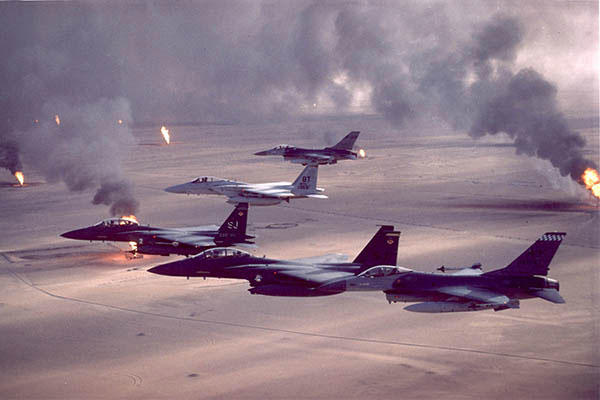It was 27 years ago today that the First Gulf War, otherwise known as Desert Storm came to an official end.
Nearly 700,000 troops from 40 nations were united as a coalition to fight Iraq's invasion of its small southern neighbor Kuwait.
We won't get into the politics or the details here, let's just discuss how this war changed things.
Made For TV
This war was the first one that was covered by the 24 hour news media. You might say this war was made for TV.
The first airstrikes and missile launches were conveniently timed to coincide with the nightly news; daily pentagon press briefings had videos from aircraft, ships, and even the weapons themselves; and every major network had their staff as near to the action as possible allowing them to give live updates as the bombs and bullets flew.
Generals like Thomas Kelley, Norman Schwarzkopf and Colin Powell became instant media celebrities, and their daily briefings were ratings gold. The nation hadn't seen wall-to-wall media coverage of a war like this since World War 2, and there really hasn't been coverage of any later wars that can match it.
Many say that the huge ratings boost CNN got as a result of its war coverage paved the way for the 24 hour news networks we have today.
Changes at the VA
After the war the VA underwent a major change. Prior to the Gulf War the VA was, let's face it, concerned mainly with older male veterans. After the war this changed, albeit a bit slowly. Since many younger veterans were now returning from war zones with different illnesses and injuries than had been seen before, the VA had to adapt.
Also, many of the veterans were female, something the VA hadn't really dealt with before. As a result, the VA now has dedicated and expanded services to female veterans.
Sure the VA was slow to adapt, and they didn't really change their main focus until 15 years later when veterans returning from the Iraq war had totally different injuries such as Traumatic Brain Injury and injuries from improvised explosive devices.
I would argue that the first Gulf War was the beginning of VA's slow change from a system that mainly dealt with middle-aged and older male veterans to an organization that regularly deals with younger veterans suffering terrible war injuries that aren't normally seen in the civilian world. You might say the VA got back to its original mission as a result of the Gulf War.
VA is now focusing on all veterans; young, old, male, female. That is something they didn't do before the Gulf War.
Welcome our Technological Overlords
This war changed the way the military used technology in many ways.
Before the Gulf War technology was cool and neat, but it was usually used as an adjunct to boots on the ground, rarely did the military rely solely on technology.
The surgical strikes from Tomahawk cruise missiles, laser rangefinders on the M-1 tank, live satellite pictures of troop movements on the ground, thermal sights and night vision goggles, laser guided smart bombs, and something new called GPS changed the way our military fights forever.
All of these technological advances did what they were supposed to do - save military and civilian lives. Because of that we continue to use them and improve them.
The Gulf War Changed The Way Civilians View The Military
Yes, we even had a National Victory Celebration - a parade in DC to welcome back victorious troops. Most people who pay attention to these sorts of things say that the general public's opinion of the military changed for the better as a result of this war.
So even though most younger veterans will laugh off the Gulf War as a "walk in the park" compared to Iraq & Afghanistan operations, and most older ones will tell you that it "was nothing like 'Nam", if you're a Gulf War vet today is your day.
Enjoy the way you changed the world.


